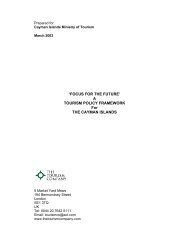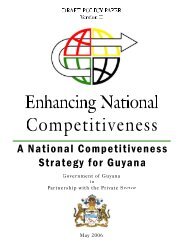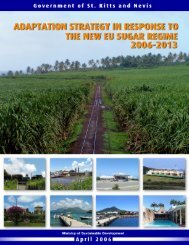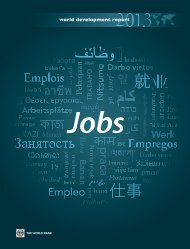Business Removing
Doing Business in 2005 -- Removing Obstacles to Growth
Doing Business in 2005 -- Removing Obstacles to Growth
- No tags were found...
Create successful ePaper yourself
Turn your PDF publications into a flip-book with our unique Google optimized e-Paper software.
49<br />
Protecting investors<br />
Who uses equity finance?<br />
What encourages equity investment?<br />
What to reform?<br />
Why reform?<br />
In July 1991 the Bank of Credit and Commerce International,<br />
otherwise known as BCCI, collapsed. Its 400<br />
branches in 70 countries closed. Investors faced losses totaling<br />
more than $10 billion. In November the same year<br />
the body of Robert Maxwell, one of Britain’s wealthiest<br />
men, was found in the sea off the coast of Tenerife. A few<br />
days later the auditors of the Mirror Group found that<br />
$900 million had been diverted as unauthorized loans<br />
from the pension fund to Maxwell’s private companies.<br />
Interest in corporate governance took off. Sir Adrian<br />
Cadbury, chair of the first committee on corporate governance<br />
in the United Kingdom, writes: “When our Committee<br />
was formed [in 1991], neither our title nor our<br />
work program seemed framed to catch the headlines. It<br />
is, however, the continuing concern about standards of<br />
financial reporting and accountability, heightened by<br />
BCCI, Maxwell, and the controversy over directors’ pay,<br />
which has kept corporate governance in the public eye.” 1<br />
Since the Cadbury report, more than 160 corporate governance<br />
guidelines and codes of best practice have been<br />
produced in 90 countries. 2<br />
Meanwhile, Kwadwo, a Ghanaian who recently returned<br />
from working abroad, is looking for additional<br />
private financing. Having saved $40,000, he wants to<br />
start a bus company to service the link between Accra<br />
and Kumasi. He is looking to buy 6 buses and needs another<br />
$30,000. So he goes to the bank but is told that he<br />
needs to put up $90,000 as collateral for the $30,000 he<br />
would borrow. This won’t do. Kwadwo approaches several<br />
people who have that kind of money and offers<br />
them a partnership. But everyone declines, afraid that<br />
Kwadwo would abscond with their money.<br />
In countries like Ghana, good corporate governance<br />
is about creating incentives for investors to provide finance<br />
without the need to exercise daily control of business<br />
operations. The typical case looks more like<br />
Kwadwo’s search for a business partner than it resembles<br />
BCCI or initial public offerings in rich countries. And<br />
potential investors worry about expropriation by the entrepreneur<br />
or managing partner. 3 But the same principles<br />
of good corporate governance apply in both rich<br />
and poor countries.<br />
Preventing expropriation from taking place, and<br />
exposing it when it does, requires legal protections of<br />
small shareholders and enforcement capabilities. And—<br />
the focus of Doing <strong>Business</strong> in 2005—it requires that the<br />
business disclose information on ownership and financial<br />
performance and on the precise nature of business<br />
transactions. Whether small investors decide to go to the<br />
court, file a complaint with the regulator or feed the information<br />
to the media and embarrass the insider, better<br />
information disclosure helps.<br />
Four types of ownership disclosure reduce expropriation:<br />
information on family, indirect, and beneficial<br />
ownership, and on voting agreements between shareholders.<br />
Two types of financial disclosure help investors:<br />
the business can have an audit committee that reviews<br />
and certifies financial data and the law may require that<br />
an external auditor be appointed. Finally, disclosure is<br />
most effective when both ownership and financial information<br />
is available to all current and potential investors.<br />
Summing these seven features into a Disclosure Index,<br />
ranging from 0 to 7, reveals that British investors enjoy<br />
among the strongest protections in the world, with a score

















